Trump: Media, Big Tech 'massively powerful, massively corrupt'
President Trump reacts to the media and Big Tech's role in politics in a 'Sunday Morning Futures' exclusive.
The year 2020 proved to be a pivotal one in tech, as companies provided essential services during the coronavirus pandemic and unveiled 5G telecom technology while facing unprecedented antitrust scrutiny and accusations of censorship amid an intense election and social justice movement.
"I think sometimes we hear that … U.S. innovation is slowing down, and I think the last year has shown that that’s not really the case," Neil Chilson, senior research fellow for tech and innovation at the Charles Koch Institute, told Fox News.
Chilson gave examples of the country’s rapid COVID-19 vaccine development, SpaceX’s astronaut launch in May and autonomous driving company Waymo’s recent announcement that its self-driving cars will be completely autonomous in trials in Phoenix.
"I’m pretty excited about the future. I think 2020 shows that the U.S. is still the world leader in tech and innovation, and we should continue to maintain our cultural appreciation for innovation and a regulatory environment that enables it," he said. "That’s what makes U.S. tech and innovation special."

Astronauts, from left, Victor Glover, Michael Hopkins, Shannon Walker and Japan Aerospace Exploration Agency astronaut Soichi Noguchi. (AP Photo/John Raoux).
Some of the most significant tech trends and stories of 2020 show exactly that, such as the sudden explosion of the video-conferencing platform Zoom.
The Zoom boom
Coronavirus restrictions were initially expected to only last for a few weeks in the spring of 2020, but as cases surged in different areas throughout the summer and into fall, large corporations, small businesses, schools and federal institutions were forced to continue most of their daily operations from home for almost the entire year.
This shift to working and learning from home led to a surge in digital communication tools such as Zoom. Eric Yuan, the company's founder, was named Time magazine's "business person of the year" for 2020.
11 ZOOM TRICKS YOU'LL WISH YOU KNEW SOONER
"We never thought about consumers or K-12 schools when we started planning the year 2020," Yuan told Time's Andrew Chow over a Zoom call.
Zoom announced that it would go public on March 22. Its userbase skyrocketed from 10 million daily participants in December to more than 300 million in April.
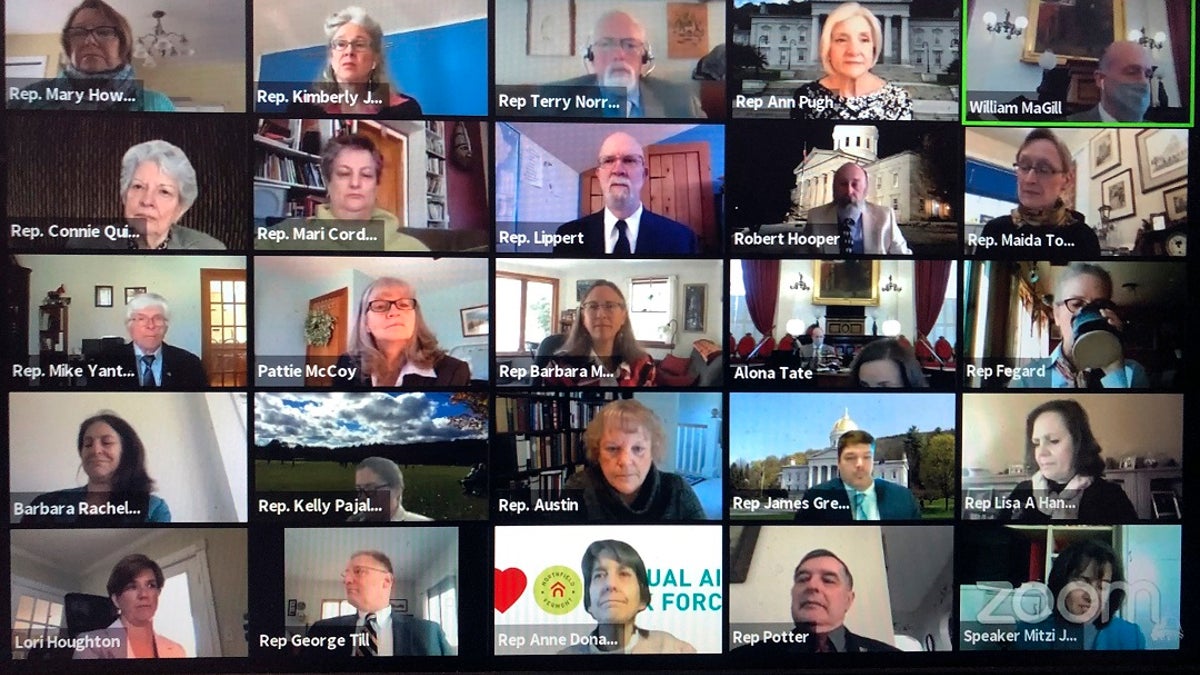
Members of the Vermont House of Representatives convene in a Zoom video conference for its first full parliamentary online session on Thursday, April 23, 2020, in Montpelier, Vt. (Wilson Ring/Zoom via AP)
The company's rapid growth also presented significant challenges, particularly during the spring of this year, as it struggled to keep up with its expanding user base and the privacy and security concerns like "Zoombombing" that followed. Zoom has made a number of updates to its product, such as end-to-end encryption, to the platform since the spring to combat such concerns
"Americans have proven that work tasks we previously thought could only be accomplished in-person can, in fact, be accomplished from remote locations," Deloitte Consulting Global Chief Technology Officer Bill Briggs told Fox News.
Briggs, who offered insight into Deloitte's 2021 tech trends report, added that what humanity has "proven is that time and technology will now wait for us, but we can harness it for incredible things."
Amazon's year
Amazon was already a dominating force in the e-commerce marketplace before the pandemic hit the U.S., but once it did, many Americans became increasingly reliant on the platform to get essential products such as toilet paper (amid a brief panic-driven shortage in some areas), food, hand sanitizer and masks delivered within one or two days and without having to leave the house.
The retail giant is nearing a market cap of $2 trillion. Its third-quarter earnings hit new records and beat Wall Street expectations after the company recorded sales of $96.1 billion, representing a 37% year-over-year increase -- a record for Amazon sales over a three-month period. The company is also expected to post record fourth-quarter sales, which will likely reflect huge online shopping numbers amid the holiday season.
A DAY IN THE LIFE OF AN AMAZON WAREHOUSE WORKER
The e-commerce platform also recently extended its arm into the pharmaceutical industry so that customers can now complete pharmacy transactions directly from their Amazon mobile apps.
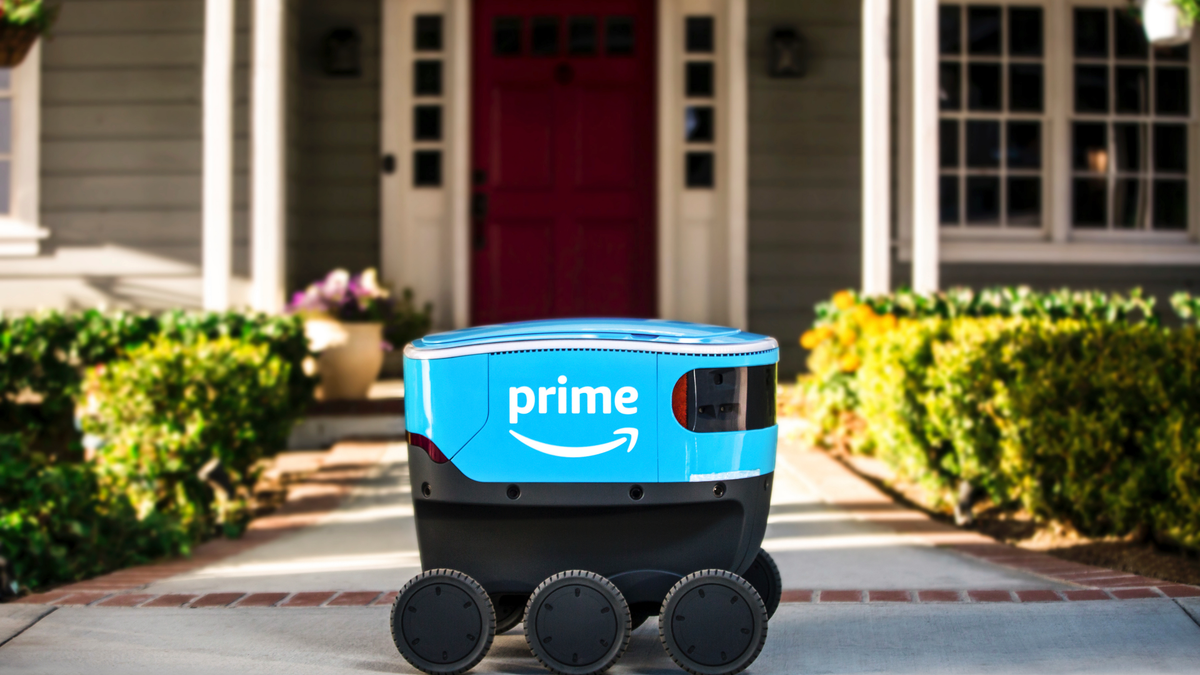
This undated photo provided by Amazon shows a self-driving delivery robot that Amazon is calling Scout. (Amazon via AP, File)
Like Zoom, however, Amazon's rapid growth and changes to procedure in 2020 led to some concerns over the company's practices and employees.
Several employees were fired after speaking out against the e-commerce behemoth's working conditions amid COVID-19, and others joined them in staging virtual walkouts and protests. One notable employee, Christian Smalls, was fired in late April after voicing concerns about conditions and has since sued Amazon over discrimination allegations.
Amazon offered $500 bonuses to essential employees who worked through June and invested about $4 billion in COVD-19-related initiatives in the second quarter of 2020. It also made 150 process updates in an effort to prevent the spread of the virus, according to a blog post.
The company has hired more than 400,000 people globally since January, which does not include an additional 100,000 seasonal workers the company added before the start of the holidays.
Medicine goes digital
As coronavirus lockdowns kept Americans from working, learning and shopping in person, it also drove people away from visiting physical healthcare centers, leading to an anticipated surge in telehealth, or digital health services ranging from primary care to therapy.
The majority of U.S. hospitals currently have telehealth apps or platforms to serve patients remotely.
CORONAVIRUS PANDEMIC IMPACT: WHAT IS TELEMEDICINE AND TELEHEALTH?
An Oct. 22 survey from the COVID-19 Healthcare Coalition that included responses from more than 1,500 physicians and other healthcare professionals found that 75% of medical workers believe telehealth provided patients across the healthcare spectrum access to better quality care.

Dr. Alan Shatzel, medical director of the Mercy Telehealth Network, is displayed on the monitor RP-VITA robot as he waits to confer with Dr. Alex Nee at Mercy San Juan Hospital in Carmichael, Calif. (AP Photo/Rich Pedroncelli)
Additionally, more than 80% of health care professionals said telehealth proved to be a more timely option for patients.
"Telehealth and remote care services have proven critical to the management of COVID-19, while also ensuring uninterrupted care for 100 million Americans with chronic conditions," American Medical Association President Dr. Susan Bailey said in a December statement. "How telehealth will be used after the pandemic is in the balance, and no one wants to see new access to telehealth suddenly halted."
She added that it is time for "government officials, physicians, patients and other stakeholders to work together on a solid plan to support telehealth services going forward."
TikTok's time to shine
TikTok, a short-form video app, also fell into the spotlight in 2020 for two reasons.
First, the app's popularity has continued to surge since it was acquired and rebranded by Chinese tech giant ByteDance in 2017, and its popularity was only strengthened by COVID-19 lockdowns. Second, the Trump administration threatened to block the app within the U.S. if it did not give Americans more control over the company's operations, citing national security concerns with the app's owner.
TikTok came into the limelight after the U.S.-based, six-second video app Vine shut down in 2016 following its struggle to make a profit. Vine and YouTube users flocked to TikTok, and the app's popularity exploded between 2018 and now.
The app popular among teens has garnered an estimated 850 million monthly active users, including 100 million U.S. users and is set to reach 1.2 billion monthly active users in 2021 – nearly three times the number of users the app had in 2018, according to app analytics site App Annie.

Comedian Sarah Cooper's page is displayed on the TikTok app on an Apple iPhone on Aug. 7, 2020, in Washington, D.C. (Photo Illustration by Drew Angerer/Getty Images)
TikTok also ranked No. 2 for global user spend in the third quarter of 2020 on the App Store among nongaming apps, research from App Annie shows.
The year turned sour for TikTok after cybersecurity company Check Point Research published a report showing "multiple vulnerabilities" in the app on the same day TikTok announced a number of significant updates to its community guidelines.
MOST VIRAL TIKTOK OF 2020 WAS EVEN BIGGER THAN THE GUY SKATEBOARDING WITH OCEAN SPRAY JUICE
The app has also come under the watchful eye of the Trump administration and China hawks in Congress. A 2017 Chinese law introduced by President Xi Jinping states that the country's citizens and organizations must comply with government requests for intelligence information.
Because TikTok is owned by a Chinese tech giant, lawmakers have expressed concerns that China could gain access to user information through the app and pressured ByteDance to give Americans more control over its U.S. operations.
"I think the strategy there has been somewhat uneven," Chilson said of the administration's handling of TikTok. "It's still not clear what the administration thinks about TikTok or about shifting ownership."
He added that while there are concerns surrounding TikTok and its management, "it's an extremely popular product competing with U.S. companies in a space that, it seems like ... people are complaining about a lack of competition."
TikTok is engaged in negotiations with Oracle and Walmart to determine what the app's future will look like within the U.S.
Tackling Chinese tech
The Trump administration has targeted other Chinese technology companies besides TikTok, including WeChat, Huawei, Hikivision and others for their connections to the Chinese Communist Party.
The administration has designated Huawei and ZTE as national security threats to U.S. communication networks over the past year.
Trump and other U.S. officials have cited China's 2017 national security law, along with companies' compliance in providing spy technology to the CCP so that it can surveil China's minority Muslim populations, as reason enough to block certain companies from operating within the U.S.
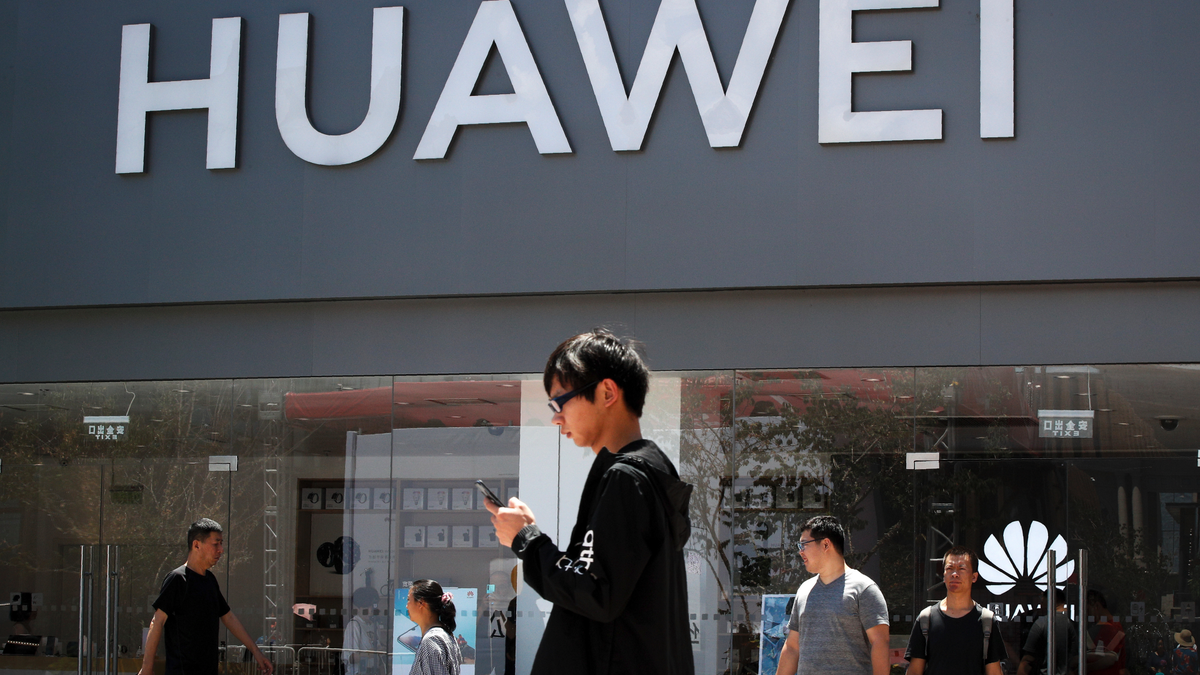
(AP Photo/Andy Wong)
The administration has been adding dozens of Chinese firms to the Entity List, particularly in the last year, alleging they helped China spy on the country's Uighur population in the northeast region of the country or for having ties to weapons of mass destruction in China's possession.
WHITE HOUSE TO TARGET MORE CHINESE APPS FOLLOWING TIKTOK, WECHAT CRACKDOWNS: NAVARRO
President Trump in November signed an order that prevents Americans from investing in 31 Chinese companies and 100 subsidiaries trading on U.S. and Chinese exchanges that help China's military operations.
In addition to the administration's general crackdown on Chinese technology due to companies' connections to the CCP, Washington has also been attempting to strengthen U.S. supply chains involved in creating certain tech products.
Specifically, the administration cut off Chinese tech giant Huawei's access to U.S.-made semiconductors, and lawmakers have proposed legislation to bring pharmaceutical supply chains back within U.S. borders so that other countries like China cannot threaten the country's access to necessary supplies.
Social justice on social media
Social media giants including Facebook, Twitter, Snapchat and TikTok were confronted with questions of how to address concerns of racial inequality over the summer of 2020 after the May 25 death of George Floyd, a Black Minneapolis man.
A video of a White police officer kneeling on Floyd's neck went viral on social media in the days after his death, prompting nationwide outrage and conversation over race relations in the U.S., particularly as they relate to policing.
After protests erupted across the nation, millions of Instagram users participated in a campaign to draw attention to the issue and away from personal lives by posting a picture of a black square to Instagram, which is owned by Facebook.
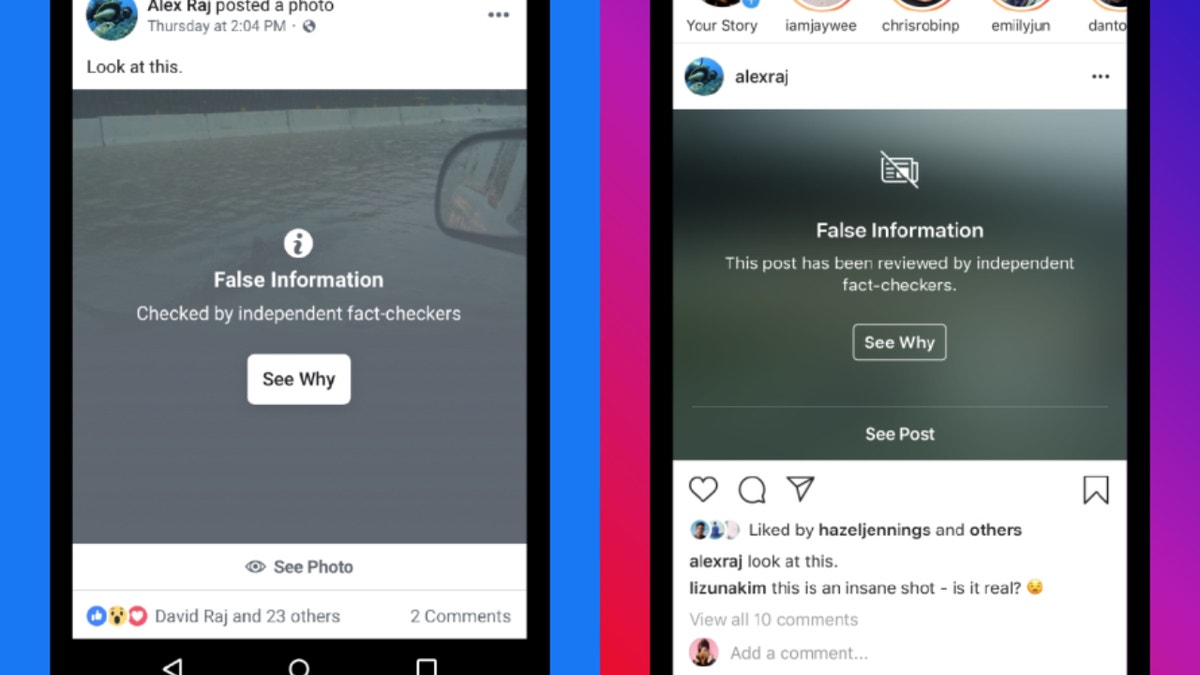
Facebook false information label (Facebook)
Later, hundreds of advertisers, nonprofit organizations and people began boycotting Facebook, saying it didn't do enough to stop hate speech on the social media platform. The campaign accused Facebook of facilitating "incitement to violence against protesters fighting for racial justice in America in the wake of George Floyd" and other Black Americans subject to police brutality.
DOJ ACCUSES FACEBOOK OF DISCRIMINATING AGAINST AMERICAN WORKERS
Independent civil rights auditors hired by Facebook in 2018 criticized the platform in a July report for not removing some of President Trump's posts.
"Facebook's failure to remove the Trump voting-related posts and close enforcement gaps seems to reflect a statement of values that protecting free expression is more important than other stated company values," the auditors wrote.
The tech giant has since added new rules to label misleading posts from politicians, an oversight board that users can access if they want to contest a decision from Facebook to remove certain posts, measures to crack down on conspiracy and militia groups and proposed changes to its algorithmic priorities addressing hate on the website.
Video streaming platforms like Netflix and Amazon Prime put together collections of TV shows, movies and documentaries about policing, prisons and race relations in the U.S.
Antitrust Issues
2020 was also the year that attorneys general from nearly all 50 states and the District of Columbia filed antitrust lawsuits against Facebook and/or Google.
Most recently, a bipartisan coalition of attorneys general from 38 states, led by Colorado Attorney General Phil Weiser, last week filed a new civil antitrust lawsuit against Google. The lawsuit builds upon a complaint that the Justice Department filed against the tech giant on Oct. 20.
"Like the DOJ suit, we focus on Google's improper maintenance and its monopoly power in general search and search advertising," Weiser said during a press call.

Twitter CEO Jack Dorsey testifies remotely during a Senate Judiciary Committee hearing on Facebook and Twitter's actions around the closely contested election on Tuesday, Nov. 17, 2020, in Washington. (Bill Clark/Pool via AP)
The suit came after Texas Attorney General Ken Paxton and eight other attorneys general filed an antitrust complaint against the company, claiming Google violated the Sherman Act when the company allegedly "monopolized or attempted to monopolize products and services used by advertisers and publishers in online-display advertising."
CALIFORNIA FILES TO JOIN US ANTITRUST LAWSUIT AGAINST GOOGLE
Google previously told FOX Business that Paxton's claims are "meritless," citing recent declines in ad tech prices and fees. A spokesperson for the company also said in a statement that "Google's ad tech fees are lower than the industry average."
Additionally, New York Attorney General Letitia James, in collaboration with 48 other attorneys general and the Federal Trade Commission, on Dec. 9 filed a lawsuit against Facebook over antitrust allegations regarding its 2012 and 2014 purchases of Instagram and WhatsApp, respectively, which the Federal Trade Commission (FTC) vetted at the time.
"This is revisionist history," Facebook Vice President and General Counsel Jennifer Newstead said in a statement to Fox News. "Antitrust laws exist to protect consumers and promote innovation, not to punish successful businesses. Instagram and WhatsApp became the incredible products they are today because Facebook invested billions of dollars, and years of innovation and expertise, to develop new features and better experiences for the millions who enjoy those products."
Section 230 under scrutiny
Facebook and Twitter faced scrutiny throughout 2020 as the companies navigated misinformation on the platform concerning the COVID-19 pandemic and the presidential election.
A number of Republican lawmakers have made calls to revise Section 230, part of a 1996 law that gives liability protections to online platforms that allow third-party users to publish content – like Facebook posts, tweets and restaurant reviews – on their websites.
Republicans have long been concerned about Big Tech's bias against conservative viewpoints, but efforts from Facebook and Twitter to reduce distribution or block the New York Post's October reporting on emails allegedly from Hunter Biden's laptop were the final straw, prompting lawmakers to summon the CEOs to testify on Capitol Hill.
Biden's father, Joe Biden, went on to defeat President Trump in the general election, nixing the incumbent's hope for a second term. Trump still hasn't conceded the race.
One of Trump's most loyal allies, Sen. Lindsey Graham, R-S.C., introduced legislation pushing for Section 230 reform.
"The time has come for these largely unregulated Big Tech giants to either be broken up, regulated, or subject to litigation for their actions," Graham said. "It’s time we put the Section 230 protections these companies enjoy on the clock."

Hunter Biden (Handout/DNCC via Getty Images)
Popular platforms maintain the right as private companies to censor user content -- the same protection afforded to all Americans under the First Amendment, which generally gives people and businesses the right to say or publish what they choose.
The president, as well as some members of Congress and other tech experts, say tech company censorship went too far, especially ahead of the 2020 presidential election and want to eliminate or curb liability protection as a result.
Facebook CEO Mark Zuckerberg and Twitter CEO Jack Dorsey have defended the law but said they are open to changes.
Dorsey suggested expanding Section 230 rather than removing it altogether during an October hearing before the Senate Commerce Committee. Zuckerberg similarly suggested that Congress "update the law to make sure it is working as intended."
"One important place to start would be making content moderation systems more transparent," he said. "Another would be to separate good actors from bad actors by making sure that companies can't hide behind Section 230 to avoid responsibility for intentionally facilitating illegal activity on their platforms. We are open to working with Congress on these ideas and more."
Tech experts argue that the law is vital to the free and open internet Americans experience today because it allows people to publish content on third-party sites without those websites facing legal consequences, which promotes free speech. In a world without Section 230, platforms would be more limited in what they could publish without risking a lawsuit.
5G boom
Fifth-generation telecommunications technology, or 5G, exploded in 2020.
It's expected to deliver internet speeds between five and 100 times faster than fourth-generation, or 4G, technology, which is what most Americans currently use. The country's adoption of 5G technology will also put U.S. tech in a more competitive position with other countries such as China that have been using 5G since last year.
Verizon announced the company now provides 5G service to a total of more than 230 million customers in more than 2,700 cities. T-Mobile's low-band 5G service covers 270 million people and 1.4 million square miles. AT&T provides 5G service to 225 million Americans in more than 14,000 cities. Apple announced in October that its latest iPhone, the iPhone 12, supports 5G service.
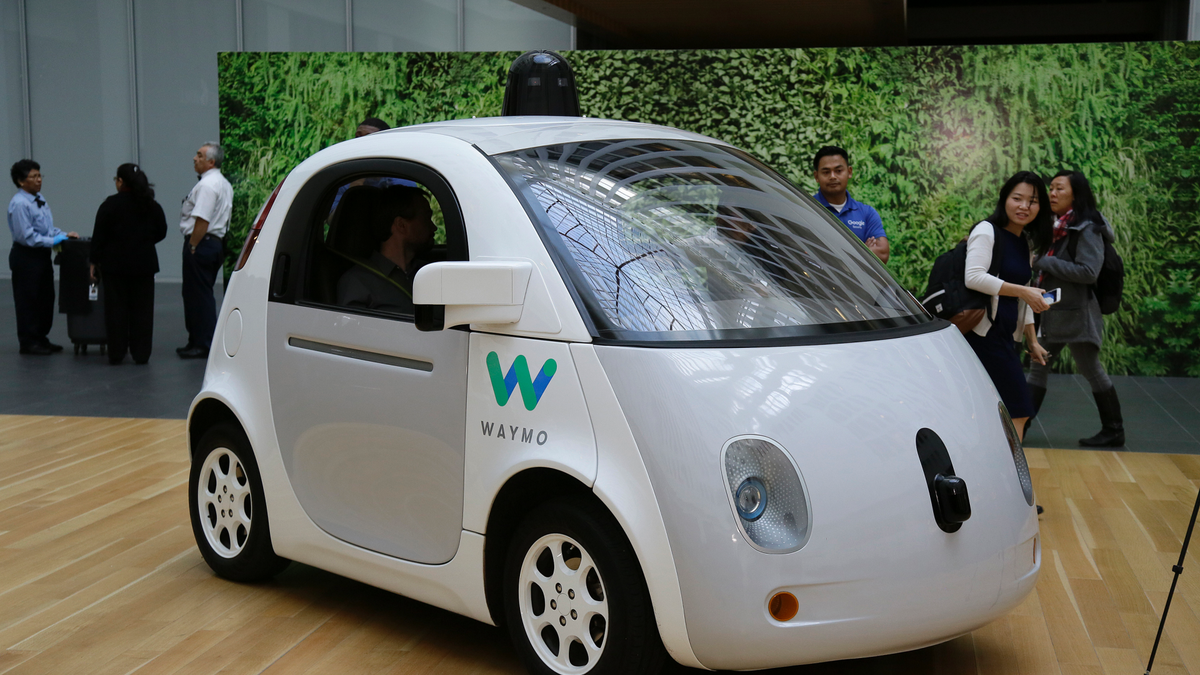
The Waymo driverless car is displayed during a Google event in San Francisco. (AP Photo/Eric Risberg, File)
Beyond faster internet service and download speeds, 5G is expected to revolutionize a number of U.S. industries because it will allow companies to connect networks of devices in ways that were previously impossible.
"We often think of wireless networks as just connecting cellphones, but ... what 5G allows is companies to add connected devices out in the world that help them do business better," Chilson said.
He mentioned how 5G will help oil and gas companies monitor pipelines, connect vehicles belonging to one transportation company and help direct autonomous cars.
Briggs similarly said that "where there have been connectivity limitations to what businesses can do because of the speed, reliability and cost" of connecting devices, 5G works more fluidly with individual devices in a network, especially when it works in line with AI and cloud technology.
E-commerce for small businesses
Big Tech proved somewhat helpful for small businesses amid the pandemic.
Companies like Amazon, Facebook and Shopify invested millions of dollars toward helping small businesses and created tools on their websites to make it easier for businesses that previously relied on in-store transactions to move online amid lockdowns.

(iStock)
"Everybody from restaurants to local corner gift shops have had to adapt, and the powerful tools that companies like Amazon or Shopify provided have made that possible in ways that wouldn't have been in the past," Chilson said. "It's now possible for that corner shop that only sold to people locally ... to sell products nationally and possibly even internationally."
NEW E-COMMERCE PLATFORM FOR AMERICAN-MADE PRODUCTS AIMS TO SUPPORT US MANUFACTURERS, ECONOMY
He added that the shift to e-commerce could make businesses more resilient amid fluctuations in local purchasing.
The Bitcoin comeback
Bitcoin's value surged through 2020 and reached record highs toward the end of the year amid pandemic-related concerns of inflation.
Bitcoin touched $21,000 on Dec. 16 -- a nearly 200% increase year-over-year.
Muneeb Ali, CEO of Blockstack, a network for building decentralized technology compatible with bitcoin, said in a statement to Fox News that the milestone "represents the breaking of a psychological glass ceiling."
"Every time we enter an all-time-high, the industry attracts more talented people, the ecosystem grows more, and the fundamentals become a little more stable. Price of Bitcoin is really a technology adoption curve, and we’re at an early stage of the curve," he said.
CLICK HERE TO GET THE FOX NEWS APP
He added that more people are starting to take notice of Bitcoin, and it has been interesting to see traditional institutions like MassMutual and larger fintech players like PayPal start to make large investments in cryptocurrency.
Companies like Microsoft, AT&T, Overstock.com and Twitch have adopted bitcoin as a form of payment. PayPal announced in October that it had launched a new service for users to buy, hold and sell cryptocurrency on the platform.
Bitcoin previously hit a high value of $19,873 in 2017.
"There's a lot of change happening on a lot of different dimensions. You've got to shift it from 'afraid of shiny objects' and this feeling of being overwhelmed by the pace and the amount of change and have some confidence in what's real, how it applies and what to do about it," Briggs said.










































